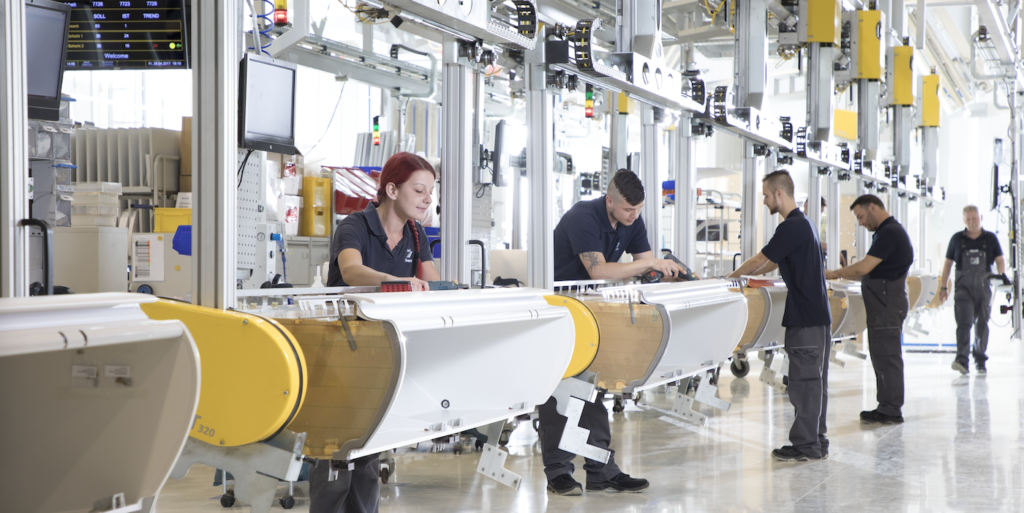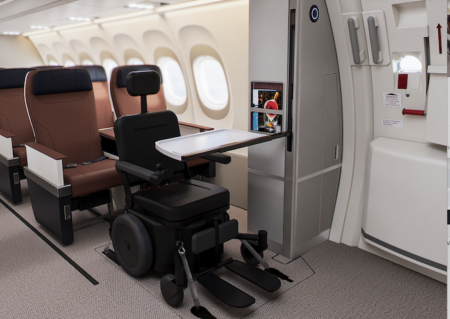The aviation industry continued to recover and grow in 2023, in many cases exceeding pre-pandemic levels. Austria-based aviation and aircraft interiors supplier, FACC AG, reports it was able to profit “exceptionally well” from the market conditions in the 2023 financial year and increased its revenues by 21.3%, to €736 million. The company also reports that its EBIT (earnings before interest and taxes) more than tripled compared to the 2022 financial year, is in line with FACC management’s expectations.
There have been challenges in the market regarding the global supply chain, but FACC countered the issues by introducing additional supply chain initiatives, including an increase in material safety stocks. The high rate of inflation in the European Union, particularly in Central Europe and Austria, and the resulting high increases in personnel costs, also had an impact on earnings.
Airbus and Boeing recorded 3,670 aircraft orders in 2023, representing an increase of 125% compared to the previous year. Deliveries also increased by 10.7%, with Airbus and Boeing building a total of 1,263 aircraft. FACC is profiting from this development due to its long-term customer contracts on all major aircraft platforms. The market is experiencing high demand for short- and medium-haul aircraft in particular.
Growth was also fuelled in 2023 by the continued high demand for business jets, with rate increases of up to 40%. With a market share of over 50% for cabin solutions for medium-sized business jets, FACC says it is the market leader in this segment. As a result, FACC’s long-term order book currently stands at a volume of around US$5.8 billion. The company’s high level of plant capacity utilisation in 2023 will therefore continue in 2024.
Significant progress was also made in implementing the FACC 2030 strategy with regard to market development for Advanced Air Mobility (AAM) solutions. The company secured development contracts with five customers in the area of passenger and logistics drones, with a total order value of around US$90 million. Once these orders have been successfully completed by 2027 and the products approved and put into service, this will subsequently lead to an increase in revenue in the future AAM product business. A multi-year contract for the overhaul of Pratt & Whitney engines was concluded in the area of aircraft and engine maintenance.

FACC expects that demand for lightweight aircraft components will continue to grow in the years ahead. In order to meet this rising demand, FACC began operations in 2023 to significantly expand its plant in Croatia. Construction work to triple the area of the plant is expected to be completed in mid-2024. The new site will then have a capacity of around one million production hours, which will provide an important contribution to achieving FACC’s growth and profitability targets.
In addition, FACC reduced the energy requirements for each million of revenue by 18.6% compared to the previous year due to improvements in efficiency. In the coming years, the company plans to cover a large part of its electricity requirements with solar energy and to reduce these further by utilising new materials and processes. With this strategy, FACC says it is well on track towards reducing its CO2 emissions by 40% by 2030 (compared to 2008), and achieving carbon-neutral production by 2040.
The latest short and medium-term forecasts in the aviation industry indicate stable growth in the current market environment. FACC’s data shows that demand for short- and medium-haul aircraft is set to increase by around 25% over the next two years, while disproportionately high growth of 50% (A350 aircraft family) and 100% (B787 aircraft family) is forecast for the long-haul aircraft segment. The FACC management expects revenue growth in the range of 10% to 15% for the 2024 financial year, accompanied by a further increase in profitability.
FACC intends to increase its workforce to around 4,000 full-time staff in the 2024 financial year – it grew its workforce by 536 new employees in FY2023.





